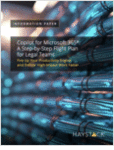The Computer Fraud and Abuse Act (CFAA) is a federal statute that provides for not only criminal liability, but also civil liability, when a person accesses a computer “without authorization” or “exceeding authorized access.” However, as a result of differing opinions among federal circuit courts, the scope of actionable conduct under the CFAA remains unclear. And due to high-profile cases like United States v. Nosal and Facebook v. Power Ventures, the CFAA has recently drawn increased attention from practitioners and scholars alike—often hoping for the Supreme Court to end the lack of clarity under the statute. This has not yet happened. Nevertheless, this attention has led to the issue of when and how can password sharing be subject to criminal (and civil) liability.
The CFAA’s Muddy Waters
There has been much debate and consternation over what the phrase “exceed authorized access” in the CFAA means. Numerous articles have addressed this issue and the circuit split concerning this issue. Nonetheless, some of this attention and analysis has been misplaced.
This content has been archived. It is available through our partners, LexisNexis® and Bloomberg Law.
To view this content, please continue to their sites.
Not a Lexis Subscriber?
Subscribe Now
Not a Bloomberg Law Subscriber?
Subscribe Now
LexisNexis® and Bloomberg Law are third party online distributors of the broad collection of current and archived versions of ALM's legal news publications. LexisNexis® and Bloomberg Law customers are able to access and use ALM's content, including content from the National Law Journal, The American Lawyer, Legaltech News, The New York Law Journal, and Corporate Counsel, as well as other sources of legal information.
For questions call 1-877-256-2472 or contact us at [email protected]










